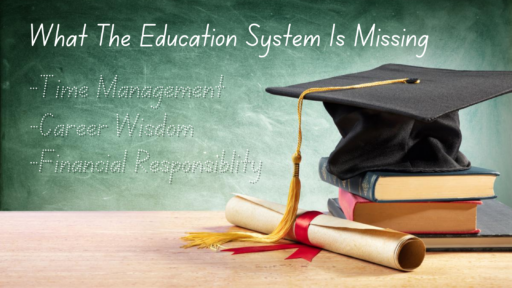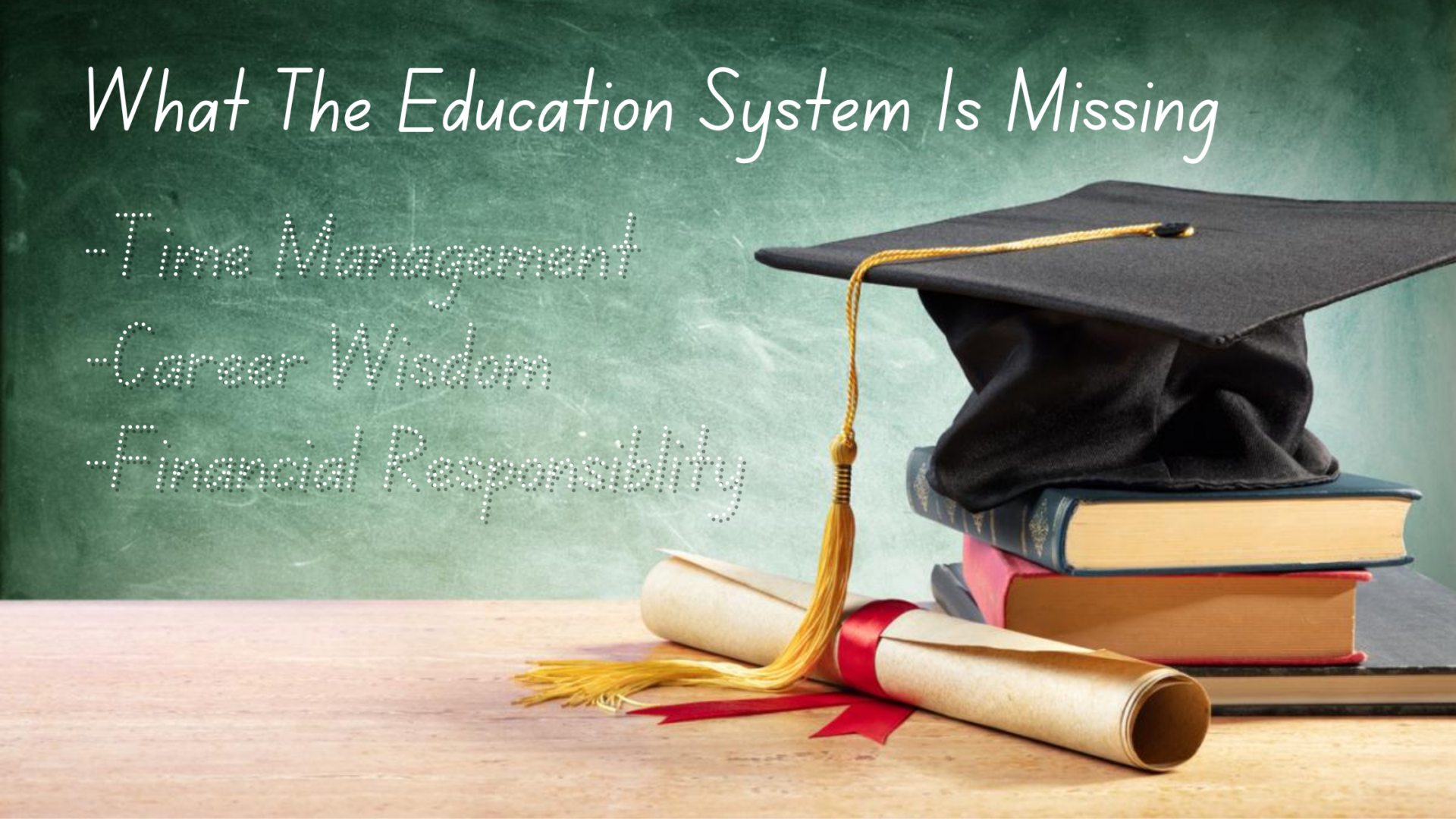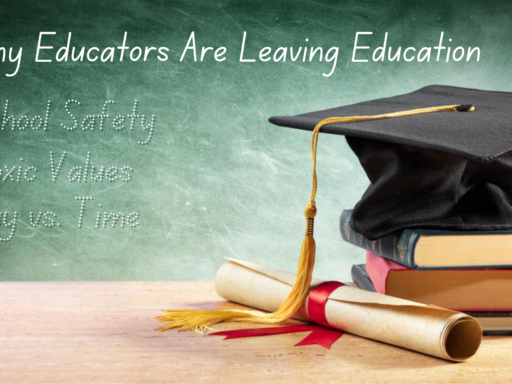Education has been a pretty hot topic for much of the 21st century. We’ve all seen parents time and time again express their valid concerns about students graduating with large gaps in their practical knowledge. What is also quite interesting is seeing the rise of teachers over the last four to five years that are leaving the profession entirely. The situation we find ourselves in, while very complex, is not something that can’t be solved if we can uncover the root cause and pair it with the innate desire to fix them.
Addressing Gaps in Student Knowledge
Time Management, Career Wisdom, and Financial Responsibility are just a few of the major problem areas we find in most students knowledge. I want to take a look at just these top three knowledge gaps and how they play out long term for students. What would it look like if we, as a society, devoted more time toward finding proper ways to teach these topics to students and would we see a more prepared group of young adults upon graduation? Would we see as many people going into college if they understood these three topics? My bet is probably not.
We find a large portion of students leaving high school and going to college on the basis that it is the only way to have a good career. This path often leads them, at least in America, to a massive mountain of debt that can follow them for years or even decades to come. This created financial burdens that are incredibly restrictive and prevent people from ever feeling as though they can truly “get ahead”. So lets pretend for a second that students did get taught time management, how to make wise career choices, and financial responsibilities. What would that look like? I’m glad you asked.
Time Management
Time management is more than just about what you do with your time. It is the process of decision making and assigning value to your time based on what is most important to you. Everything comes with an opportunity cost. Opportunity cost is the idea that for every opportunity you have (where you do decide to spend your time), you are giving up something else (the cost of spend time the way you want). While it may seem like a relatively easy to understand ideology, most people are never taught to think this way. They simply go through life making choices and determine after the fact if it was a good choice or a bad one. If we began to actively teach students about opportunity cost, and how that should be applied to their available time, and what outcomes come as a result of how time is spent I truly believe we would see students finding better ways to spend their time.
Right now most students take the “easy route” with their free time, and i honestly don’t put any blame on them. They are surround by people and educators and more specifical educational policy that teaches them to work hard to get a good job so they can have fun in their free time. If we took the time to build this type of time-based decision making into their work-life balance when they are younger, we would be able to show them that two hours of videos games a week compared to two hours of reading or additional learning a week when your 15 can be the difference that changes the car you drive, the house you live in or even the career you have. Not saying this is guaranteed 100% of the time, but we owe it to students to provide them the resources and the guidance to understand how time management can be a life alter skillset.
Career Wisdom
On the Prototopics Podcast this week, we discussed the 16 lowest paying jobs five years after graduating from college and the results are very telling. Unfortunately, we see that nearly 50% of students go into fields that often have very low paying roles. Students in areas of Liberal Arts, Education and Psychology unfortunately made that list, but we see so many students going in that direction. We are adults and educators, again, need to provide the resources to students to point them in the right direction. Am I suggesting that we force students to not go into that career areas? Not at all. What I am suggesting is that we need to be having honest conversations about student motivations and their reasoning for going into careers and let them know of the difficulties that may lie ahead in each career.
Women in STEM fields are a great example of a field where this discussion is already taking place. People are very quick to point out the lopsided numbers of men versus women in this field, and most women understand the uphill battle they will have while climbing the ranks in a STEM environment. It seems as though the conversation ends there. Why are we not talking about low paying, high stress jobs and the impact that will cause or the course of students professional careers. Marine Biology is another field where many high school students say they want to pursue, only to find out that the job field is limited and the pay is incredibly diluted, respective to other fields. We have all the data to verify these claims, why are educators not having these conversations with students? I am not saying that students aren’t capable of making their own decisions and we shouldn’t support them, but I do believe that we have a responsibility to those students to help them understand the potential challenges that lie ahead in a given career.
Financial Responsibility
What is a credit score? How do I get a credit card? What is the difference between a checking and a savings account? These are all questions that at one point I’m sure you had. The harsh reality is that they do impact everyone, everyday and yet we expect high school graduates to just figure it out. The fundamentals of money can be easily understood in a one semester course, but can help students better prepare for the world ahead. As credit card debt hits new highs and savings accounts hit lows, this conversation becomes more important than ever. In a world were many of the decisions that we make (buying a house, car, going to college, etc.) require credit, why are we waiting until students are rejected the first time to teach them about this importance? Get them a secured credit card, and provide them the freedom to make mistakes on a small scale that can be turned into teachable moments.
There are a variety of financial decisions that people will make in their early adult life that require a basic understanding of finances, and most people don’t have it. I’m not blaming individual people for this, but our educational structure as a whole. The very foundation of not discussing money with students cause those very same students to have bad relationships with money in the future. When we teach students that money is a tool, no different then a compass or a calculator, we can realign their perception of money and help them find new ways to make money work for them. We also need to do a better job of break down the comparison between different money amounts and what money should be allocated toward what expenses – AKA how to decide when to spend money and where. I know too many people with thousands of dollars in credit card debt that 1) don’t know how to get out from under it, but 2) often times have nothing to show for the mountain of debt they’ve created for themselves. These problems are entirely avoidable, but it begins with a structure of teaching students the long-term ramifications of financial responsibility.
I am not an educator in a traditional school setting anymore, but I do know that those years are very impressionable years for students and if we can change the conversations we are having with students, we can change lives. This goes beyond time management, career wisdom and financial responsibility. This is a large scale movement that requires all hands on deck to finally deliver on the promise of schools: to set up students for future success. Are they doing it now? Maybe, but it seems more like a hit or miss. Common core certainly isn’t making anything better, so its time we take the educational sector back and give students the chance they need to succeed.









